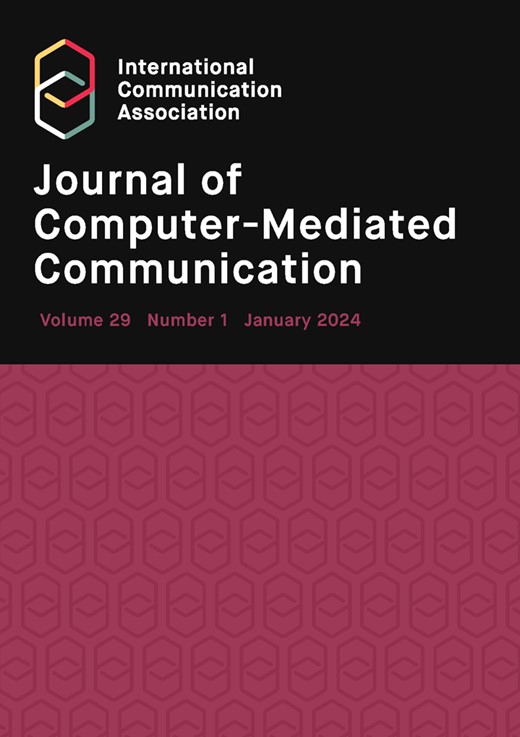时间重要吗?一项两波面板研究调查了微信支持对社会资本和幸福感的影响
IF 5.7
1区 文学
Q1 COMMUNICATION
引用次数: 0
摘要
本研究从社会资本框架和社会情绪选择理论出发,探讨了个体的未来时间观如何改变其社会资本过程,进而影响其幸福感。一项两波调查在不同账号的微信用户中展开。研究结果表明,不同的微信功能导致了社会资本的联结和桥接,而微信功能又对个人的积极情绪和心理健康产生了不同的影响。重要的是,多群体分析显示,面向未来的用户从广播性支持中获得更多的满足感,而面向现在的用户从关联性支持中获得更多的情感收益。值得注意的是,研究发现,频繁参与可审查性功能只会减少那些拥有开放式FTP的人的微信社交资本。这一发现为社交媒体支持的理论知识做出了贡献,并为社交媒体开发者提供了实际意义,通过考虑用户的社交目标优先级,利用社交媒体来改善用户在整个生命周期中的幸福感。本文章由计算机程序翻译,如有差异,请以英文原文为准。
Time counts? A two-wave panel study investigating the effects of WeChat affordances on social capital and well-being
Drawing from the social capital framework and socioemotional selectivity theory, this study examines how individuals’ future time perspective (FTP) alters their social capital processes, which further influences their well-being. A two-wave survey was conducted across WeChat users possessing different FTPs. The findings showed that bonding and bridging social capital accumulation were attributed to differential WeChat affordances, which in turn exerted disparate influences on individuals’ positive affect and psychological well-being. Importantly, multigroup analyses revealed that future-oriented users were more fulfilled from the broadcasting affordance, whereas present-oriented users derived more emotional gains from the association affordance. Notably, frequent engagement with the reviewability affordance was found to diminish WeChat bonding social capital only for those who possessed open-ended FTP. The findings contribute to theoretical knowledge of social media affordances and provide practical implications for social media developers in harnessing social media to improve users’ well-being across lifespans by considering their priority of social goals.
求助全文
通过发布文献求助,成功后即可免费获取论文全文。
去求助
来源期刊
CiteScore
9.60
自引率
2.80%
发文量
26
期刊介绍:
The Journal of Computer-Mediated Communication (JCMC) has been a longstanding contributor to the field of computer-mediated communication research. Since its inception in 1995, it has been a pioneer in web-based, peer-reviewed scholarly publications. JCMC encourages interdisciplinary research, welcoming contributions from various disciplines, such as communication, business, education, political science, sociology, psychology, media studies, and information science. The journal's commitment to open access and high-quality standards has solidified its status as a reputable source for scholars exploring the dynamics of communication in the digital age.

 求助内容:
求助内容: 应助结果提醒方式:
应助结果提醒方式:


